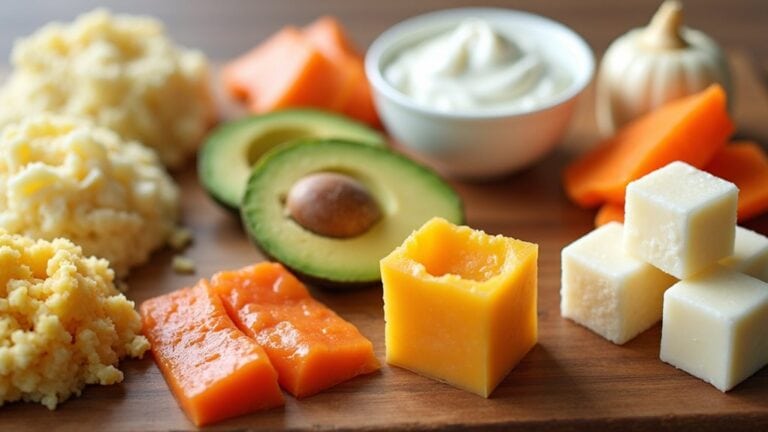Envision swapping your morning toast for buckwheat pancakes—yep, that’s how easily you can boost your nutrition without sacrificing flavor. Packed with protein, fiber, and antioxidants, this gluten-free powerhouse isn’t just for health nuts; it’s for anyone who wants to eat smarter. Whether you’re managing blood sugar, craving a hearty meal, or just curious about trying something new, buckwheat’s got your back. Ready to see what else it can do for you?
Buckwheat Is a Nutrient-Rich Gluten-Free Alternative
Buckwheat isn’t just another gluten-free option—it’s a nutritional powerhouse packed with benefits your body will thank you for.
Unlike refined gluten-free grains, buckwheat delivers a solid punch of protein, including all essential amino acids, making it a smart choice for plant-based eaters.
It’s also loaded with minerals like magnesium and iron, which keep your energy up and support muscle function.
With its low glycemic index, buckwheat helps steady blood sugar, making it a friend for those managing diabetes.
Plus, it’s a great source of fiber to keep your digestion smooth.
Don’t forget the antioxidants—rutin and quercetin fight inflammation, adding extra health perks.
Whether you’re gluten-sensitive or just want a nutrient boost, buckwheat’s got your back.
Buckwheat Supports Cardiovascular Health
Beyond its role as a nutrient-packed gluten-free option, buckwheat does more than just fuel your body—it actively protects your heart. Packed with amino acids like lysine, it helps lower cholesterol, a key player in cardiovascular health. The antioxidants in buckwheat, like rutin, fight inflammation, easing stress on your arteries and reducing heart disease risk. Plus, its magnesium content keeps blood pressure in check, so your ticker doesn’t work overtime.
| Buckwheat Benefit | How It Helps Your Heart |
|---|---|
| Lowers cholesterol | Amino acids block bad LDL buildup |
| Reduces blood pressure | Magnesium relaxes blood vessels |
| Fights inflammation | Antioxidants like rutin protect arteries |
Adding this health food to meals is an easy win for long-term heart health. Your body—and heart—will thank you.
Buckwheat Enhances Digestive Health With High Fiber Content
Should you’ve ever struggled with sluggish digestion or bloating, adding fiber-rich foods like buckwheat can make a real difference.
Buckwheat packs about 10 grams of high fiber per 100 grams, keeping your digestive health on track by promoting regular bowel movements and easing constipation. Its soluble fiber helps your gut absorb nutrients more efficiently, while resistant starch acts as a prebiotic, feeding the good bacteria in your gut health.
This combo not only supports a smoother digestive system but also boosts overall nutrient absorption. Plus, the fiber in buckwheat keeps you full longer, reducing unnecessary snacking.
Buckwheat Is Versatile in Sweet and Savory Dishes
Whether you’re whipping up breakfast or planning dinner, buckwheat fits right in without missing a beat. Its nutty flavor and gluten-free nature make it a star in both sweet and savory recipes.
Use buckwheat flour for fluffy pancakes or hearty bread, or toss cooked buckwheat groats into salads for a chewy, nutritious twist. Craving something cozy? Stir it into porridge or bake it into muffins for a healthy boost.
For dinner, swap rice with buckwheat in stir-fries or grain bowls—it soaks up flavors like a champ. Even soups and stews benefit from its adaptable texture.
No matter how you use it, buckwheat delivers health benefits without sacrificing taste or convenience. It’s the versatile ingredient your kitchen’s been waiting for.
Buckwheat Aids in Weight Management With Low Calorie and Fat Content
Should one be searching for a filling yet low-calorie food to help with weight management, buckwheat could be your new go-to. With just 201 calories per cooked cup, it’s a smart choice should you be watching your intake.
It’s practically fat-free, with only 1 gram of fat per serving, so you won’t pack on extra calories from unhealthy fats. The high fiber content—4 grams per cup—keeps you full longer, curbing unnecessary snacking.
Plus, its complex carbohydrates and stable blood sugar effects help you avoid energy crashes and cravings. Buckwheat’s nutrient profile supports sustained energy, making it easier to stay active and manage weight.
Add it to meals, and you’ll feel satisfied without the guilt.





